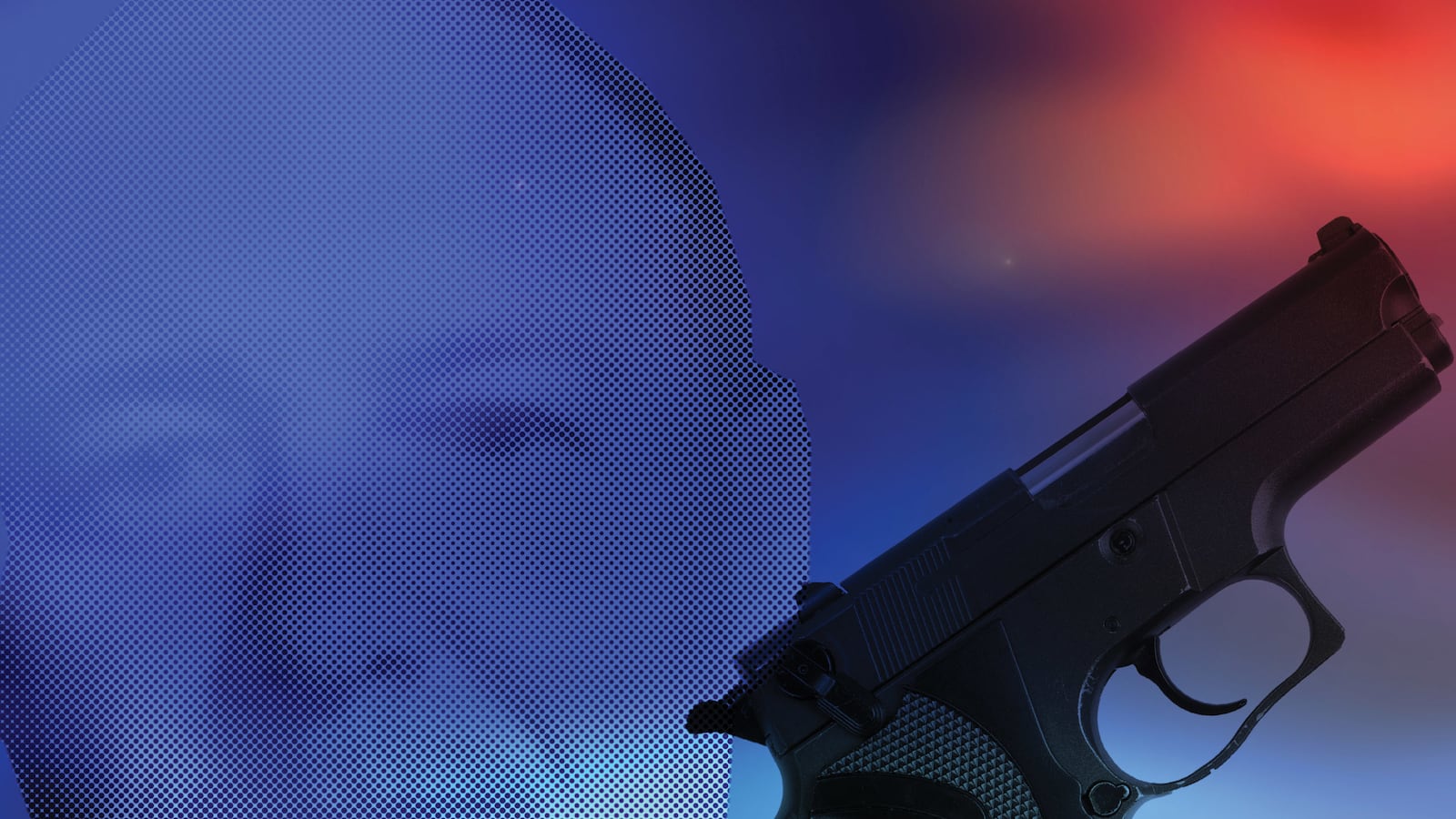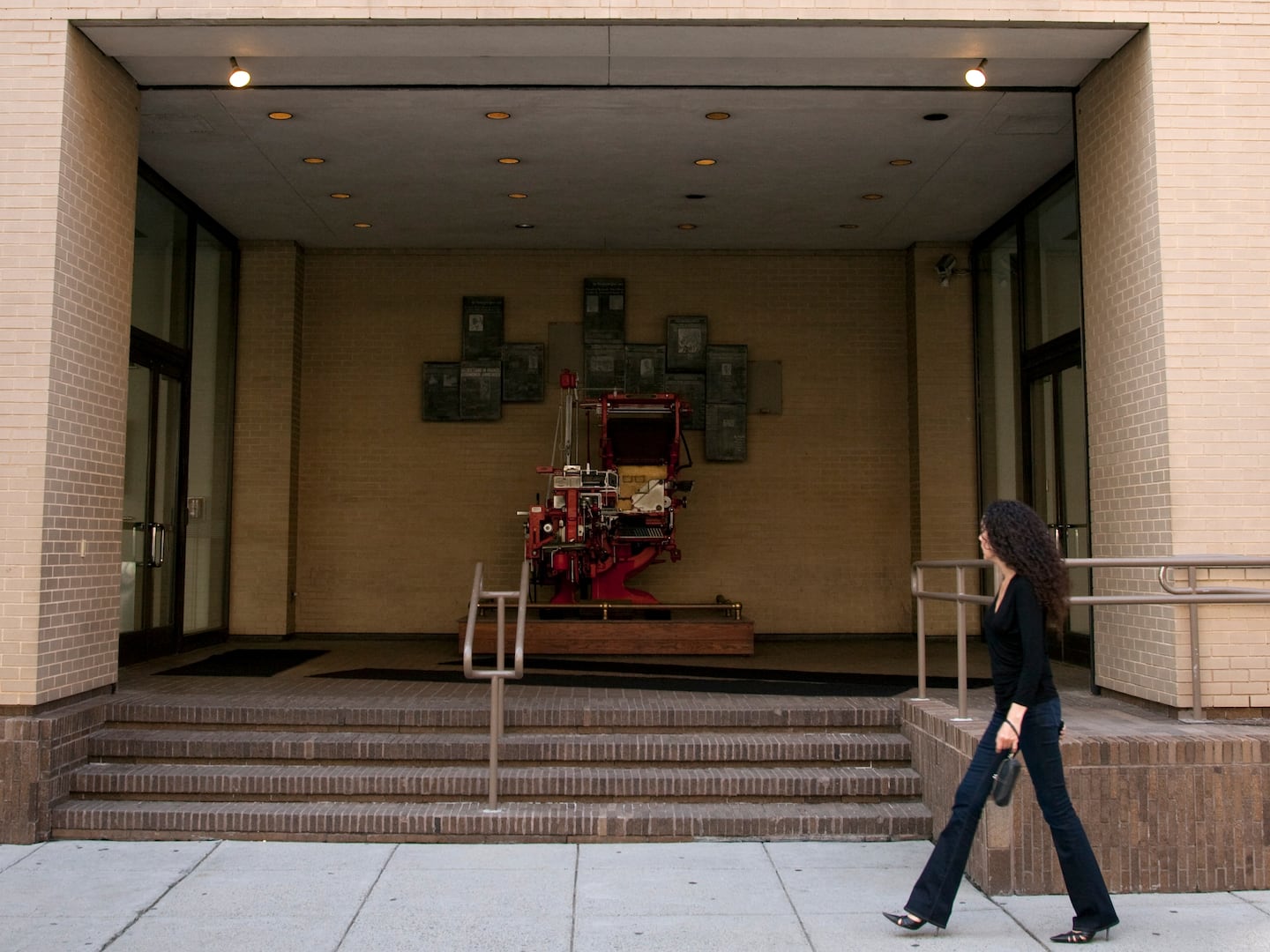The puff of air whiffing past Michelle Schumacher’s head was just a warning shot.
“I looked at the wall and there was no hole,” she said, before turning back to her husband of 29 years. “He had a gun in his hands.”
Then came the final warning.
“If you don’t get the hell out of this house right now the next one is going into your head,” Marcus Schumacher thundered while clutching a pellet gun.
Michelle fled for her life, her kids followed and then two SWAT teams engaged in what turned into a 12-hour standoff in Fargo, North Dakota, on Feb. 10 that featured an unusual, if not unethical consideration by cops:
Tell the gunman to kill himself.
Fargo Police Lt. Bill Ahlfeldt had already given “the greenlight” for snipers to “engage the target with rounds to eliminate the threat,” he wrote in an after-action report. As his fellow officers were taking incoming fire from Schumacher’s rifles, Lt. Ahlfeldt and two fellow senior cops discussed using “negotiation tactics that would try to encourage Mr. Schumacher to stop the threat himself by committing suicide.”
The local prosecutor said SWAT never told Schumacher to kill himself, but police told The Daily Beast they would not take the suicide option off the table.
“Will it come up again? I can’t said if it will or won’t,” Dept. Chief Anderson said, unwilling to rule it out. “That’s the decision of the chief,” he said, referring to Fargo’s Police Chief Dave Todd.
“What’s important to remember is these decisions aren’t made in a vacuum...there’s no cookie cutter approach,” Anderson added.
Michelle doesn’t believe the powers when they say Schumacher wasn’t urged to kill himself.
“I have been promised his death certificate and I haven’t gotten it. And I haven’t seen the autopsy report,” she told The Daily Beast in an exclusive interview.
Michelle’s husband never lost a bout as a senior Golden Gloves boxer, but he took many lifetimes worth of lumps outside the ring.
“He had so many hits to his head over the years,” Michelle said of her late husband’s countless concussions, which began in high school football and continued long after being honorably discharged in 1990 as a second lieutenant in the North Dakota National Guard.
Most of the head damage came from his work as a foreman installing cellphone towers around the country.
“He fell from a 100-foot tower and suffered gangrene infection in his leg and jarring of his head,” she said of Marcus (who was nicknamed “Eddie”).
A fall off a ladder caused him to “walk crooked” and require monthly injections to numb crippling back pain. And he almost died instantly when a crane “snapped and hit him,” crushing his helmet.
And then there was the lightning strike.
“He was 60 feet up, then [a bolt] went through his body and into the back of his left leg, sucking him into the tower,” Michelle said.
The years of trauma to mind and body left him a physical and mental mess.
“It started with him forgetting appointments,” she remembered of her husband’s gaffes on job sites. “Guys at his work were telling me he wasn’t on cue anymore,” she said. “They’d tell me, ‘Eddie just wasn't himself.’”
The gaffs at work also hit home. One multiple occasions he forgot people’s faces. He failed to remember his 4-year-old grandson.
“It was like watching my grandfather going through Alzheimer’s,” she said.
During a recent family camping trip Schumacher screamed at his daughter, who he mistook for his wife, Michelle.
“He kept screaming at her and she finally slapped him across the face and yelled, ‘Dad, snap out of it,’” the widow said.
After finishing a job in Montana, Schumacher came home to nurse his injuries, but cabin fever soon set in.
“He was getting stir crazy and started applying for jobs,” Michelle said.
The couple agreed that before harnessing back up in the sky to rig cell antennas, he’d meet with a team of doctors to render a prognosis.
“Eddie was supposed to go through a phase of tests and see a psychiatrist,” she said. “Brain scans, dexterity tests, and memory tests.”
On the last full day Schumacher was alive, Michelle asked him about a text message he got while he was in the shower about a new job prospect. “‘I thought you were going to go to the doctor,’” she recalls saying, “and he said, ‘I’m not going to go.’
“It was weird because he got really mad. It was off the scales,” she said.
After she erased his text message about the job, Schumacher thought she deleted the contact entirely and snapped. That’s when he took a shot at her with the pellet gun.
“I’m leaving,” she told him, which was met by a cold reply:
“Good. I want you to go.”
Michelle and her two sons left and then dialed 911, telling the dispatcher that Schumacher was downing pills and watching TV with a .22 caliber rifle on his lap. They suspected he was suicidal.
When cops approached the home at 8 p.m., Schumacher greeted them with a volley from his .22 and .243 rifles.
Det. Philip Swan got on the phone with Schumacher and asked, “What was happening today?” and he replied, “his wife is a bitch and he wanted to show everybody,” the report claims.
Schumacher denied being suicidal and explained that he’d picked up his rifle and taken pills to deal with excessive “pain issues” and that “when his wife got home she got on his case, causing him to be mad.”
He also told the detective he’d hoped his stunt would draw local TV news broadcasts.
“I then informed Marcus that the news was aware of the situation and it was time to give up and come outside which Marcus refused to do,” Swan wrote.
Schumacher kept shooting at police officers, then admitted he shot a cop and “that the officer was lying in the alley.”
The shots didn’t stop, according to multiple reports.
And yet Marcus Schumacher asked the detective, “What are you doing, why haven’t you gotten him yet? He’s still lying in the alley.”
The man he shot was six-year Fargo policeman and Minnesota National Guard veteran combat medic Jason Moszer. The 33-year-old father and husband had set up the perimeter to protect civilians and evacuate neighbors from Schumacher’s shots.

“He was very steady and well-liked,” Fargo Deputy Chief Joe Anderson said. “He had kind of different sense of humor, liked to joke and have fun and he did his job well.”
Moszer had longstanding hopes to wear the badge as he came up through the city’s Explorers program.
He also served valiantly combat medic for the Minnesota National Guard, surviving multiple tours in Iraq and Bosnia.
Leon Schwan knew Moszer well as his son Drew and the fallen cop were best friends.
He said that Moszer always wanted to serve and his family came first.
“Jason had a boy and a girl that were his step children, but he took them in as his own,” the 65-year-old retired sheriff’s deputy said.
When his son Drew, a paramedic learned of his best friend’s critical state he was crushed.
“Drew heard about an “Officer down” and he went to the hospital and found out it was Jason, and I know he was right beside him for a couple of days,” Schwan said of his son’s bedside vigils, which ultimately ended when Moszer breathed his last.
The cop down turned the standoff into a catastrophe.
It was nearing midnight and SWAT teams tried to smoke Schumacher out of his house with tear gas canisters, two BearCats and robots.
The efforts seemed futile since Schumacher simply had more to aim at.
“After our team began launching gas, suspect Schumacher began shooting...towards the BearCat… [and] where my other gas team was located,” according to Lt. Bill Ahlfeldt’s report.
Simultaneously, Det. Swan was carrying on with Schumacher “creating small talk” and the shooter said he took “multiple pills (two different types)” and that he repeated that “he was adamant he was not going to commit suicide” but that “things were going to end badly tonight.”
At this point a sniper managed to nail Schumacher twice in the arm. Schumacher told negotiators he was hit and “bleeding badly.”
The two carried on even when Schumacher was bleeding out. Swan asked if Schumacher wanted an ambulance and medical attention and he replied “that he did.”
Once aware the cop killer was wounded, Lt. Ahlfeldt “ordered the team to continue placing gas into the residence … to try to push him either out of the residence or close to a window so that we could try to stop the threat.”
Meaning get a clean shot to take Schumacher out.
But then the chatter between the SWAT negotiators and Schumacher silenced. Swan promised to send an ambulance and told Schumacher to “start crawling towards any door.”
Then he heard another, final shot.
“Shortly after I said that there was another bang and then silence,” Swan wrote. “I was unable to get any kind of response from Marcus [Schumacher].”
Inside, cops found “Schumacher lying face down on the floor by the table,” Ahlfeldt’s wrote in his report.
Cass County State’s Attorney Birch P. Burdick opened an independent investigation into the case and concluded that “no criminal charges were warranted” against the SWAT sniper who wounded Schumacher.
The only reason Schumacher died was Schumacher.
“The evidence supports that the head shot killing Schumacher was self-inflicted,” he wrote.
Burdick told us that there was nothing he saw or heard that compelled him to believe the responding officers forced Schumaker to end his life.
“There was never any conversation about committing suicide between the two of them,” Burdick told The Daily Beast of the chatter between Schumacher and negotiator Swan.
Swan was “trying to get Schumacher to put down his weapons and come out,” but the shooter “was not desiring to do that,” Burdick said.
“Whatever was discussed about varying tactics, what I heard was only the conversation they had with Schumacher,” he added. “And that was, ‘Let’s bring this to an end!’ and ‘Let’s put out your guns down and come outside.’”
Burdick says SWAT teams and Fargo Police didn’t push Schumacher to end his life.
“Whether they considered suicide as a possible tactic it wasn’t something they implemented in the case,” he said.
And Fargo Deputy Police Chief Joe Anderson won’t second-guess his officers who were coping with the death of their brethren, and dodging bullets.
“Already one police officer was killed, which is one too many.
“There’s always a luxury of being able to Monday morning quarterback the tactics and the what-ifs. And what if Mr. Schumacher had continued to shoot and strike a bunch of civilians?”
When Moszer’s body hit the asphalt after being struck by Schumacher’s gunfire, Anderson said he promised he wouldn’t “engage.”
Anderson says Schumacher doublecrossed them because as their BearCats approached to secure Moszer “[Schumacher] fired multiple rounds at our armoured vehicle...That was untruthful,” Anderson said.
“We’re on-scene trying to determine ways of resolving this incident without any more loss of life,” he added. “Whether that means Mr. Schumacher came out safely or not.”
All options were on the table, including suicide.
“That technique, if you will, was a suggestion,” Anderson said. “That was part of a discussion to think outside-the-box to try to resolve this.
“It was briefly put on the table but went no further than those three individuals,” he said, adding that it wasn’t implemented because “we hadn’t trained on and it wasn’t necessarily an ethical way of resolving that situation and it wouldn’t work.
“It was an extreme decision and discussed but never put in place and not something that is widely supported.”
Nobody wanted suicide. They wanted to get Schumacher out alive.
“The best scenario to play out would have been Mr. Schumacher to put down his weapons and surrender to us,” Anderson said. “He was in the driver’s seat and he made the decision to take his own life.”
When she learned Fargo cops thought about convincing her husband kill himself, Michelle ran to a toilet to vomit.
“How could anybody think that telling somebody to commit suicide was a good thing to do?” she said.
She likened the tactic as a kind of power play on the weak.
“Our youngest son was subjected to bullies,” she said of kids who picked on him for having systemic fibrosis. “He had bullies saying, ‘You’re not worth being on this earth.’ And this is like bullies telling my husband, ‘You’re not worth it. Just go kill yourself.’”
Marcus Schumacher wasn't going to kill anybody but Marcus Schumacher that day. “It breaks my heart that he got to that point and if somebody only would have helped him we wouldn’t be here.”
She said that when she phoned authorities after being shot at with the pellet pistol she implored multiple times to reach people that her husband would trust. Each time, she says, cops rebuffed her.
“I told them ‘I’m his wife and he doesn't give a rat’s patoot about your negotiators; you need to get these guys to talk to him,’” she said. One of her suggestions happened to be a Fargo Police deputy that owned the boxing gym where Schumacher trained with his son Cody.
“They called me back only after the police officer was shot and asked me, ‘What can we do to solve this situation?’
“I told them, ‘I already told you who to call and you didn’t want to do it.’ I even spelled out everything and explained that he will listen to these guys. They still didn’t want to hear it.”
In Schumacher’s case they tried everything. “We launched gas to get him out and that didn’t work,” he said. “We were certainly not going to rush into the house to force an armed standoff after losing an officer. You’re forced back to those negotiations and when he’s not willing to talk you try to end the situation in a somewhat expedient manner.”
As Michelle’s search for answers stalls she’s been calling a hotel home since the one she always knew is a bombed out pit and deemed “unlivable” after police fired 27 tear gas canisters into it and with their BearCats “knocked the home 12 inches off its foundation.”
“I became widowed and homeless in this little space of time,” she said. “It’s hard.”
Michelle is left with a few voicemails of Marcus that she replays over and over again to be able to have a few moments each day with the man she loved, whom she beat at darts and was willing to nurse as his health was nearing hopeless.
“I still have five messages from the road that I saved on my phone,” she said. “One of them he’s saying, ‘Hey hun, just checking in to see how you’re doing?’ And another is, ‘Miss ya and I can’t wait to get home.’”
But the calls she and her kids want to hear are Schumacher’s last words before he died. “My kids want to hear it and get a feel for what he was saying,” she said. “I do too.”






